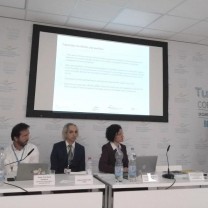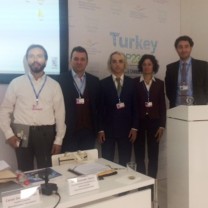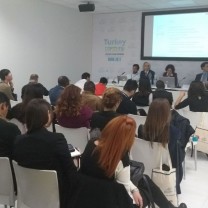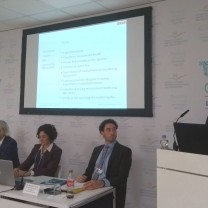
Presenting MRV-Turkey experiences at COP23
The side event “MRV in Turkey: From Theory to Practice” was held on 14th November at the Turkey Pavilion as part of UN Climate Change Conference (COP23) that took place in Bonn, Germany between 06-17 November 2017.
Initiator of the side event was the MRV Turkey Project “Capacity development for the implementation of a monitoring, reporting and verification system for greenhouse gas emissions in Turkey” which is implemented by the Deutsche Gesellschaft für Internationale Zusammenarbeit (GIZ) in collaboration with the Ministry of Environment and Urbanization of Republic of Turkey.
The event focused on the challenges and lessons learned during the implementation of the Project.
Opening remarks and a presentation on the Establishment of an MRV system in Turkey were given by Mr. Alexander Haack, Director of Energy and Climate Cluster of GIZ Turkey. It was presented that the successful establishment of the MRV system in Turkey was due to strong cooperation with the private sector, efficient knowledge transfer between Germany and Turkey, and sustainable capacity building through a revolving fund for a dedicated training institution. The successful implementation in Turkey has sparked interest in other countries seeking for advice - two outreach events in Ukraine and Tunisia will hence support the knowledge transfer in the region.
Ms. Canan Derinöz Gencel, Head of Environment and Climate Change Department at the Turkish Cement Manufacturers’ Association (TCMA), presented experiences in the Cement Sector in Turkey.
Mr. Volkan Orhan Tekin from Turkish Petroleum Refineries Corporation (Tüpraş) continued with a presentation about their Experiences on MRV Steps.
Mr. Yavuz Sucu, Environmental Chief at Iskenderun Energy Production Company (ISKEN) shared MRV experiences of the electricity production sector.
Lastly, IPC-Mercator Fellow Assoc. Prof. Barış Karapınar presented his study on potential macroeconomic and employment effects of market based mitigation mechanisms in Turkey. The findings of this study laid down that although there were challenges for fossil sectors, there would still be an overall employment advantage when decarbonising energy intensive sectors.




